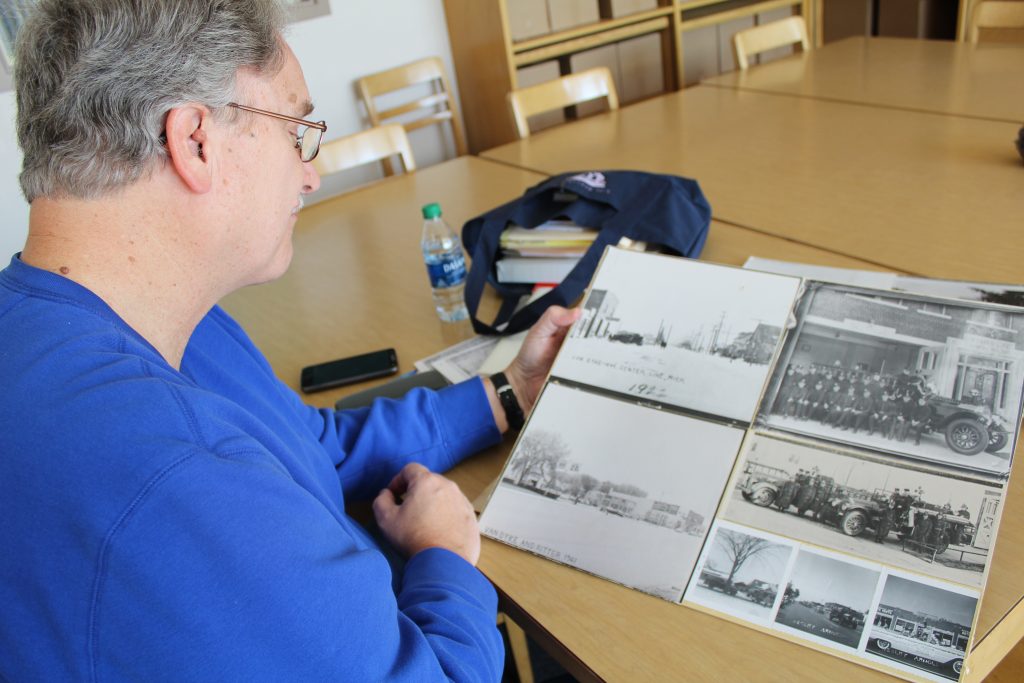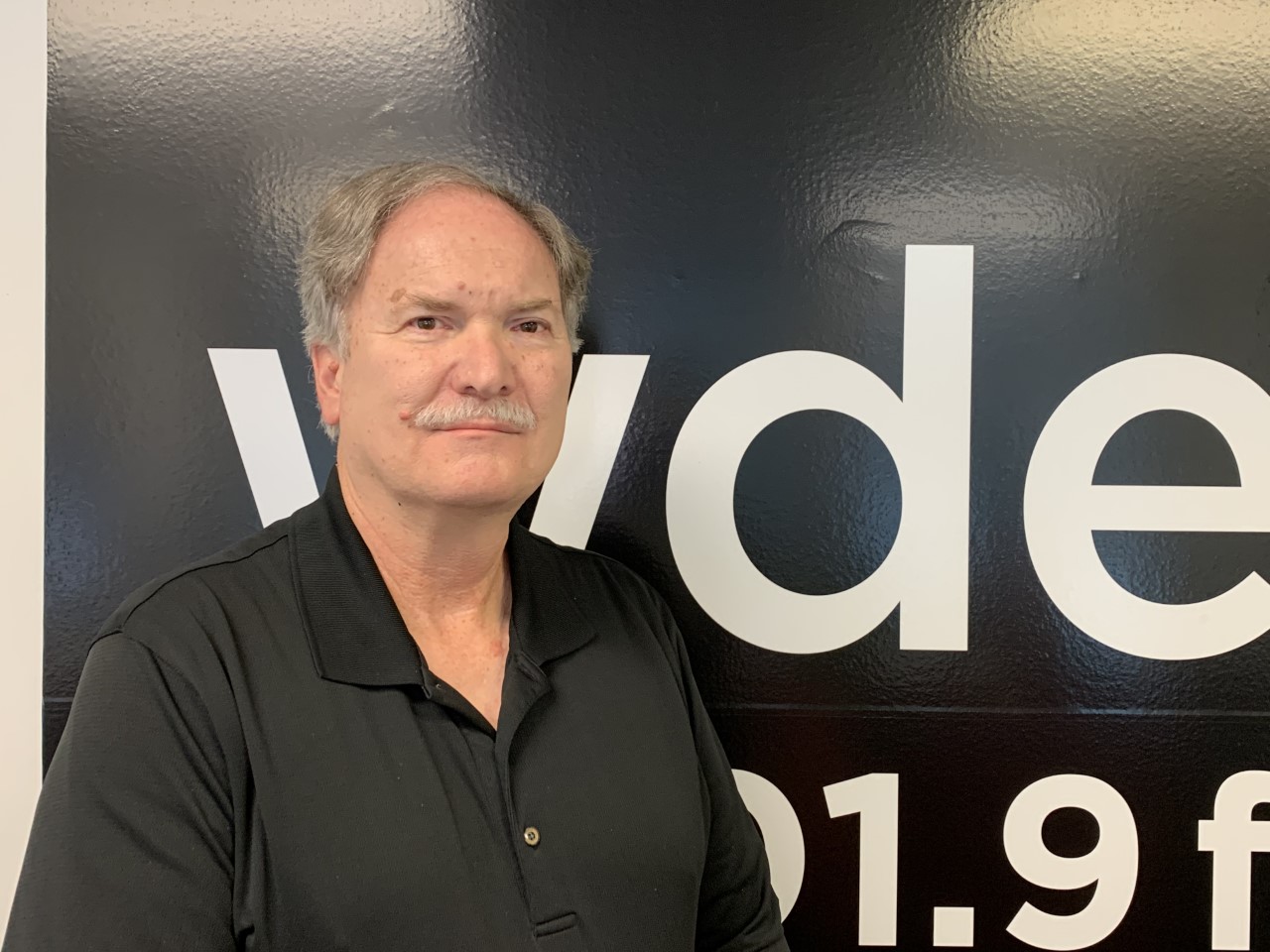His Family Settled Center Line. Now, He Preserves Its History
Mike Grobbel’s family came to the area in the 1800s. He now leads the local historical society.

Mike Grobbel chairs the Historical Society of Center Line.
It’s a fitting position, as his ancestors came to the area from Germany in the 19th century. He was born in Detroit, but grew up in Center Line and attended the city’s schools.
“We need to engage residents and determine what’s important.” – Mike Grobbel, Center Line Historical Society
Although he doesn’t live there anymore, Grobbel says his family history sparked his interest in Center Line’s history.
Crossing the lines
101.9 WDET’s Crossing the Lines series explores what unites the Metro Detroit region and what divides it.
Why Center Line? The city is completely surrounded by Warren, and can often be subsumed by its larger neighbor in the minds of metro Detroiters. In addition, it is a community with a deep history as well as a significant shift in diversity over the past 20 years. See more coverage
“I had a personal website, so I was putting up photos from our family collection, and was contacted by a fellow named Wesley Arnold, who had been collecting photos of Center Line going back to the 1960s, when he was in high school,” Grobbel says.
The two eventually formed a historical society, which meets monthly, usually the first Friday at 10 a.m. at the Center Line Public Library.
Grobbel spoke with WDET’s Pat Batcheller about preserving the history of the area, and what it will take to move the society forward.
Click on the player to hear Mike Grobbel’s conversation with WDET’s Pat Batcheller, and read a transcript, edited for clarity, below.

Pat Batcheller, 101.9 WDET: A lot of historical societies are based inside historic homes. Do you have a permanent home?
Mike Grobbel, Center Line Historical Society: No, we don’t. We do have our collection and a secure area where that’s stored, but it’s not open to the public. That’s a dream down the road for us. We hope to get there someday, but we have to start with a collection. This [society] probably should have been formed a generation ago. We’d have been able to get a lot more of a collection started earlier. We’re starting a little bit late, but there’s still plenty of stuff out there, and as people learn from us, we’re getting more and more items donated to us.
What would you need to get a permanent location that the public could visit?
First, we’d need a permanent site for storage. We have a temporary location, and they’ve asked us if we could find another location soon because they want to reuse that area. Where we are able to find a new location will dictate how and when we’ll be able to hold public displays. In the meantime, we hope to be able to make temporary small displays that we could put at the city’s recreation building or at the library, and rotate the items from our collection so that people can see them.
What’s the biggest change you’ve seen in Center Line in your lifetime, and how does it shape the city’s history?
I would say the biggest change happened around 1965 when I was still in school. The city began an urban renewal program, which ultimately demolished a number of the old storefront buildings along Van Dyke Ave. and redeveloped it with shopping centers and a high-rise tower for senior citizens. It changed the character and appearance of the downtown area. I think it’s probably for the better, because a lot of those buildings at the time were 40 or more years old. Some were much older than that. That was initially kicked off by the expansion of St. Clement Parish, which began acquiring some storefronts so they could build the church that’s currently there.
How did that urban renewal change the character of the city?
Before, you would know the owner of a business, because that person would greet you when you walked in the door. My mom would go to Sam Robinson’s department store to buy a shirt or shoes, and Sam would be there. That was probably the biggest change.
One of the goals of any historical society is education. Do you visit Center Line schools?
Not yet. We’ve had some discussions with the district and expressed an interest and willingness to come into the schools and present artifacts and tell some of the stories and the history of our area. What we need to do is align it with their curriculum. We’re in the talking stages at this point, but that is one of our goals.
You said this probably should have happened a generation ago. How do you generate interest for the next generation to carry on your legacy?
We hope to engage and acquire additional members, particularly residents. Many of the members on our board no longer live in Center Line. We want to expand, and the point we’re trying to make is that we’re creating history today, too. We don’t want to miss any of that. We need to engage residents and determine what’s important, what ought to be saved, photographed, or copied.
What would you like non-Center Liners — people who don’t have a connection to the city — to know about it?
I tend to say that it’s not really a suburb. At least, at one time it wasn’t. It was its own community, surrounded by farms that serviced the city. It was a long ride into town to bring firewood, vegetables and things like that to the market. Over time, the expansion of Detroit and other suburbs engulfed us. Going back, it’s a long history. It was in the boondocks, now it’s just a quick drive.
Support the news you love.
Here at WDET, we strive to make our journalism accessible to everyone. As a public media institution, we maintain our journalistic integrity through independent support from readers like you. If you value WDET as your source of news, music, and conversation, please consider making a gift today. Even $5 a month helps!
